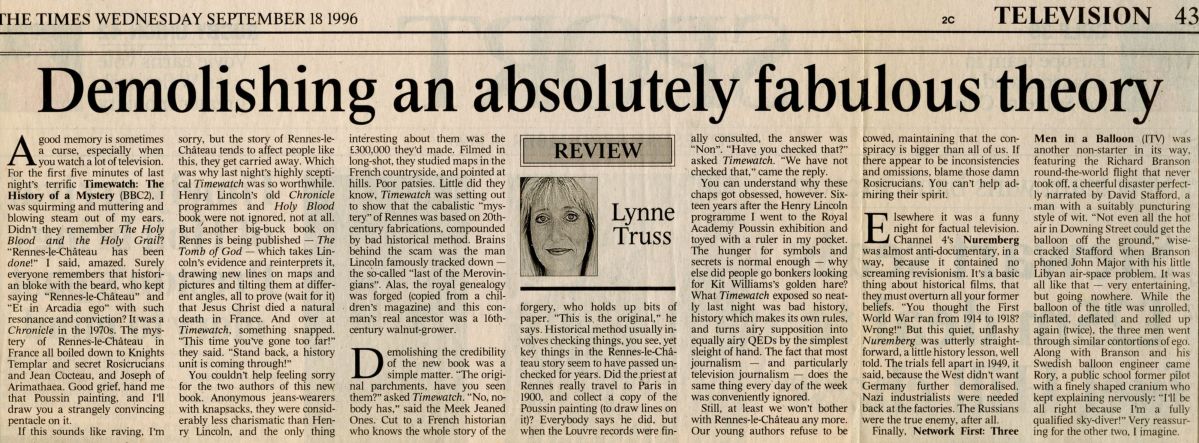|
©The Times Newspaper
--------------------------------------
Demolishing an absolutely fabulous theory
Lynne Truss
The Times
18 September 1996
A good memory is sometimes a curse, especially when you watch a lot of television. For the first five minutes of last night's terrific ‘Timewatch: The History of a Mystery’ (BBC2), I was quirming and muttering and blowing steam out of my ears. Didn't they remember ‘The Holy Blood and the Holy Grail’? “Rennes-le-Château has been done!” I said, amazed. Surely everyone remembers that historian bloke with the beard, who kept saying “Rennes-le-Château” and “Et In Arcadia Ego” with such resonance and conviction? It was a ‘Chronicle’ in the 1970s. The mystery of Rennes-le-Château in France all boiled down to Knights Templar and secret Rosicrucians and Jean Cocteau, and Joseph of Arimathea. Good grief, hand me that Poussin painting, and I'll draw you a strangely convincing pentacle on it.
If this sounds raving, sorry, but the story of Rennes-le-Château tends to affect people like this, they get carried away. Which was why last night's highly sceptical ‘Timewatch’ was so worthwhile. Henry Lincoln's old ‘Chronicle’ programmes and ‘Holy Blood’ book were not ignored, not at all. But another big-buck book on Rennes is being published – ‘The Tomb of God’ – which takes Lincoln's evidence and reinterprets it, drawing new lines on maps and pictures and tilting them at different angles, all to prove (wait for it) that Jesus Christ died a natural death in France. And over at ‘Timewatch’, something snapped, “This time you've gone too far!” they said, “Stand back, a history unit is coming through!”
You couldn't help feeling sorry for the two authors of this new book. Anonymous jeans-wearers with knapsacks, they were considerably less charismatic than Henry Lincoln, and the only thing interesting about them was the £300,000 they'd made. Filmed in long-shot, they studied maps in the French countryside, and pointed at hills. Poor patsies. Little did they know, ‘Timewatch’ was setting out to show that the cabalistic “mystery” of Rennes was based on 20th-century fabrications, compounded by bad historical method. Brains behind the scam was the man Lincoln famously tracked down – the so-called “last of the Merovingians”. Alas, the royal genealogy was forged (copied from a children's magazine) and this conman's real ancestor was a 16th-century walnut-grower.
Demolishing the credibility of the new book was a simple matter. “The original parchments, have you seen them?” asked ‘Timewatch’. “No, nobody has”, said the Meek Jeaned Ones. Cut to a French historian who knows the whole story of the forgery, who holds up bits of paper. “This is the original”, he says. Historical method usually involves checking things, you see, yet key things in the Rennes-le-Château story seem to have passed unchecked for years. Did the priest at Rennes really travel to Paris in 1900, and collect a copy of the Poussin painting (to draw lines on it)? Everybody says he did, but when the Louvre records were finally consulted, the answer was “Non”. “Have you checked that?” asked ‘Timewatch’. “We have not checked that”, came the reply.
You can understand why these chaps got so obsessed, however. Sixteen years after the Henry Lincoln programme I went to the Royal Academy Poussin exhibition and toyed with a ruler in my pocket. The hunger for symbols and secrets is normal enough – why else did people go bonkers looking for Kit Williams's golden hare? What ‘Timewatch’ exposed so neatly last night was bad history, history which makes its own rules, and turns airy supposition into equally airy QEDs by the simplest sleight of hand. The fact that most journalism – and particularly television journalism – does the same thing every day of the week was conveniently ignored.
Still, at least we won't bother with Rennes-le-Château any more. Our young authors refuse to be cowed, maintaining that the conspiracy is bigger than all of us. If there appear to be inconsistencies and omissions, blame those damn Rosicrucians. You can't help admiring their spirit.
|

